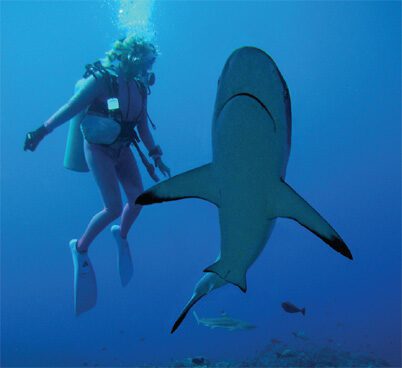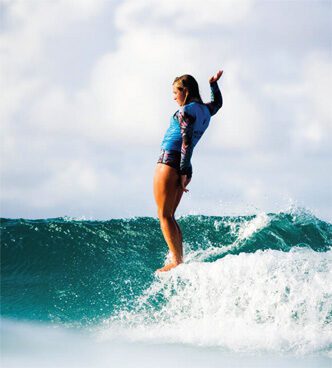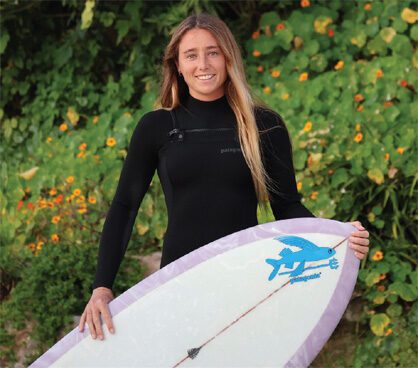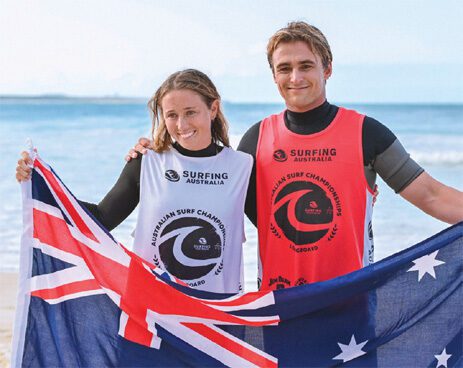Meet two local women quietly making a huge difference to the environment as we mark International Women’s Day on 8 March
Valerie Taylor: Marine conservationist
By Tamara Spray
Valerie Taylor is a familiar face to many, having spent much of her life in the spotlight. Along with late husband and underwater cameraman, Ron, the pair championed the cause of marine conservation and graced TV screens in the 1960s and 1970s, diving in locations around Australia, getting up close with sharks and other underwater creatures.
Valerie wore an iconic pink wetsuit and together with Ron, the pair were pioneers in navigating the underwater world.
“When you’re the first, it’s a big adventure,” Valerie says. “There’s no one to tell you anything – you just find out for yourself. Now there must be a thousand books written on the subject, but back then the only book we had was Diving to Adventure by Hans Hass.”
Now at 88, the long-time Fairlight resident is taking a stand, calling for shark nets to be outlawed on the Beaches.
Ironically, it was spearfishing that led Valerie, over time, to marine conservation. Valerie’s father had lead poisoning, a result of making batteries during WWII, and was unable to eat meat. Valerie would go spearfishing as a way to bring her father dinner, and later joined the local St George spearfishing club, where she met Ron. The pair became friends, each becoming the respective female and male world spearfishing champions.
It was during one championship that they made a decision. “Ron and I both got out of the water about the same time and there were all these beautiful dead fish lying on the sand,” Valerie recalls. “Ron looked down and he said, ‘I’m not doing this anymore,’ and I said, ‘I don’t want to either.’” The pair walked away from the sport and the following weekend, they took their cameras under the water instead and started filming sea life.
The pair sold their footage internationally, with Valerie saying the footage ‘had to be (of) sharks or something potentially dangerous, and they liked to have me swimming around in the middle of it.’
Following the success of their 1971 film, Blue Water White Death, the pair worked in Hollywood on the 1975 blockbuster movie Jaws – a film which Valerie says made many people afraid of sharks. “It was a story of a fictitious shark (but) people took it seriously,” she says.
Valerie’s own encounters with sharks were very different to those portrayed in Jaws. She has a particular love for the grey nurse shark, saying ‘they’re just big puppy dogs.’ Valerie wrote many letters to politicians as part of a successful four-year campaign to have the grey nurse shark protected by law in 1974 – a worldwide first for any shark species.
Her conservation work continues as she campaigns to have shark nets removed from the Beaches along the north coast. “There’s more danger getting to the beach and being run over by a car crossing the road than getting attacked by a shark. (With) most attacks, they’re not looking for food, they’re wondering what you are,” Valerie says. “They (sharks) don’t have hands, they feel with their teeth.
“I’ve had them feel me with their teeth a few times and I’ve only ever had to go to hospital once!”

Ron Taylor Film Productions
Valerie still campaigns, and recently joined with other conservationists to have a win with the Sutherland Shire Council voting to remove shark nets from Bate Bay beaches. Valerie would like to see shark nets removed from the Northern Beaches.
Having seen many creatures like a baby dolphin caught in a net, ‘with scratch marks all over it where the mother tried to pull it out,’ Valerie believes more education is needed. “It would be better to teach the community that goes to the beach how to react if there’s a shark in the area,” she explains.
Valerie has an award named in her honour, as part of the Northern Beaches Council’s Underwater Photography Competition, and says she still receives fan mail from around the world: “It’s when they say, ‘I’ve been in the water and I’ve seen a shark, and because you told me not to be afraid, I wasn’t afraid.’ That makes me feel a little bit pleased.”

Tully White
Tully White: Surfer and climate activist
By Aoife Moynihan
Manly’s Tully White learned to surf with friends when she was about 14 years old, and quickly got hooked. She entered the Manly Malibu Club when she was 15 and was encouraged to compete at club events along the east coast and state and national titles.
Now, at 25, Tully is ranked number 12 in the World Surfing League’s (WSL) longboard leaderboard. Ranked number one here at home, she won the open women category at the 2024 Australian Longboard Titles on the Gold Coast. She will represent Australia at the 2025 International Surfing Association (ISA) World Championships.
She first represented Australia in the 2018 ISA World Championships in China. Her first overseas competition was exciting for her, wearing the national uniform. The team even took a jar of Australian sand with them.
“They had a glass box where every country poured in a jar of the sand from their local beach,” says Tully. “That was a pretty cool moment to be part of.”
Tully has represented Australia in places such as El Salvador, California, and Abu Dhabi, where they use a wave pool!
“Surfing in a wave pool is an amazing experience,” says Tully. “It’s very different from the feelings you get in the ocean. It brings an exciting challenge because you know when your wave is going to be – down to the second – and it brings a different level of pressure, of course. Abu Dhabi was unreal, with the desert sunset in the background, an orange glow over the city and sand dunes.”
Tully’s surfing profile gives her a platform to share her other passion: the environment. She always loved the outdoors, but it was swimming with whale sharks in Western Australia that was a defining moment.

Tully was hooked on surfing as a teen
“I was captivated by the marine biologists on the boat,” Tully explains. “The way they shared their love for whale sharks and the ocean and just the way they educated as well as inspired was really cool.”
She completed a degree in environmental science online with Charles Sturt University, which allowed her to keep ‘chipping away’ at her studies while travelling. Now, she advocates for the environment and shares her knowledge with others through her surfing career.
She’s an ambassador for Surfers for Climate, an Australian charity uniting the surfing community to advocate for the environment.
“A lot of surfers feel a natural connection to the ocean,” explains Tully. “They want to look after it because they get so much from it. Surfers for Climate gives surfers resources and pathways to activate that energy: such as stopping new offshore fossil fuel developments, implementing climate solutions and suggesting practical ways to reduce their footprint.

Tully with fellow Australian Longboard champion 2024 Declan Wyton
“We also help connect surfers with petitions and paddle- outs and contacting their local MPs, as that kind of thing can be a step outside people’s comfort zone. We bridge that for the surf community and make it a little bit more accessible.”
A proud local, Tully is part of the Northern Beaches Council My Manly campaign, and shares her favourite spots with the public on the hellomanly website.
She also raises funds for SurfAid, who help families in remote surf communities access healthcare, clean water and food.
“Surfers often travel to remote corners of the world, which can extract resources from small communities, and SurfAid essentially gives back to the remote communities,” says Tully.
“You can have quite an impact through sharing your passion for what you love.”








